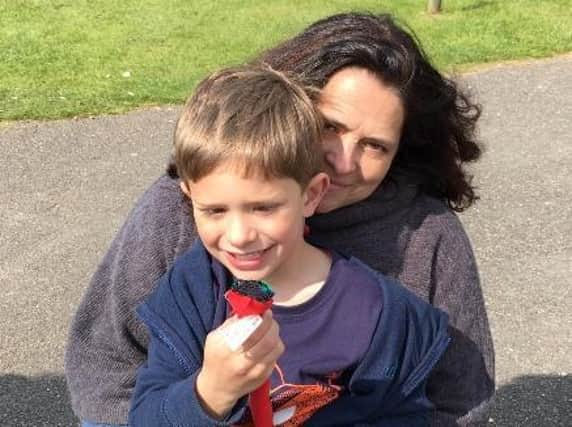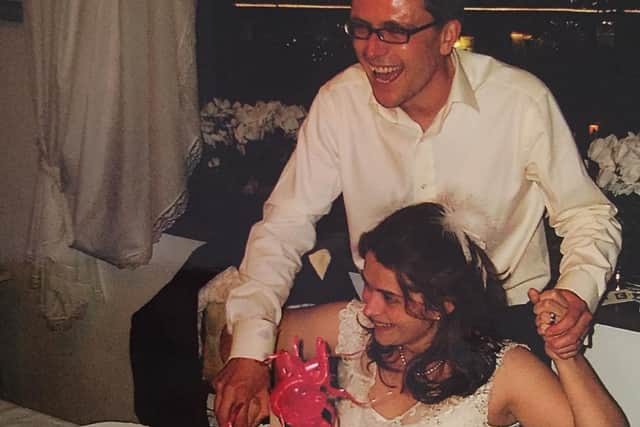Mother of one from Steeple Claydon opens up on charity help after she was paralysed from the waist down


- Carol Barraclough, from Steeple Claydon became paralysed 14 years ago after she fell ill with a rare neurological condition, transverse myelitis
-Carol now wants to share her experiences of the condition to help raise awareness for the work of the Spinal Injuries Association (SIA), who helped her as her world was turned upside down and where she now volunteers as a support network co-ordinator
Advertisement
Hide AdAdvertisement
Hide Ad- The condition left her completely paralysed from the waist down and in a wheelchair - before she became involved in the charity she said she felt isolated and had 'nobody to talk to'


Carol Barraclough from Steeple Claydon wants to raise awareness of a charity which helped her get her life back on track by sharing her experiences of becoming paralysed from the waist down 14 years ago.
May 15 is Spinal Cord Injury Awareness Day, and Carol wants to share her experiences of being diagnosed with transverse myelitis and how SIA helped her during some difficult times.
She said: “Back in 2006, I woke up one morning with excruciating back pain and pins and needles in my right leg. My then boyfriend (now my husband) took me to A&E, where I was prescribed hearty painkillers for my back pain and sent on my way.
Advertisement
Hide AdAdvertisement
Hide Ad“But within a few days I started walking with a drop foot and lost sensation completely in my right leg. I went back to hospital and was diagnosed with transverse myelitis. It’s a rare neurological condition that causes inflammation of the spinal cord; either a virus or your auto immune system attacks the mylene sheath that protects the spine.
"In my case, quite devastatingly, to the point where just one attack left me paralysed at vertebra T9 (around the belly button level if you’re wondering where that is).
"I spent just shy of six months in hospitals
“Upon discharge, I returned to my home where I lived with my boyfriend, a beautiful, two-storey farmhouse. It had a downstairs bathroom but the ground floor was multi-level so not easy. Looking back, it wasn’t suitable at all – but it enabled us both to get back to some sort of reality."
After spending so much time in Hospital, Carol just wanted to get back to life as normal as possible.
Within three weeks she was back to work.
Advertisement
Hide AdAdvertisement
Hide AdShe wanted to learn as much about her condition as possible so decided to join SIA who were suggested to her at Stoke Mandeville Hospital.
"“I remember visiting the Spinal Injuries Association (SIA) stand at Stoke Mandeville Hospital, which at the time was manned by the charity’s volunteers. I was really keen to learn everything about my injury and the community I was now part of, but I didn’t really want to speak to anybody about it.
"I joined SIA straight away but I was resistant to being ‘part of the club’ at first.
“In hindsight that support was going to be really important. And once you do engage with SIA, the opportunities to develop, understand and learn are endless."
Advertisement
Hide AdAdvertisement
Hide AdFast forward to now, and Carol is married with a child, Albert and is now working for SIA as a support network co-ordinator.
In her role she offers information, advice and positive insight into life for families affected by spinal injuries.
Carol continued: “Becoming a mum in 2014 was perhaps one of the most amazing, yet daunting times of my life. I have plenty of friends who are parents but none who have a physical disability so had to resource what I could.
"We bumbled our way through and were able to manage with predominantly off-the- shelf products such as car seats, cots, etc. I carried Albert in a sling until he could walk and then
used reins when he started toddling when we were out.
Advertisement
Hide AdAdvertisement
Hide Ad"I was so scared of him scurrying off and not being able to keep up. Thankfully, children are pretty robust and dungarees are a godsend for scooping them up off the floor! I am Albert’s normal and he knows the obvious differences between what Mumma and Daddy can do.
"Our lives are very much the same as those of any parent – we visit the usual places; we do the normal things. Sometimes with assistance, sometimes we are fine on our own. As he has grown, life has become easier without a doubt, though his cheekiness has also developed!"
Carole and her Husband, Johnny now have to split their time between work, home schooling Albert, their son.
They receive advice from their school in what to teach him and how to structure their days.
Advertisement
Hide AdAdvertisement
Hide AdCarol added: “I do quite often get asked how I came to be in a wheelchair. The assumption is generally that I had an accident; people ask me when I had my accident, how did it leave me disabled.
“However, there is a growing awareness about people, like me, who’ve sustained an SCI through illness.
“I think it’s really important people are aware of that. The fact that it can happen to anybody. Someone has just existed. Spinal cord injury caused by illness is at least as common as injury caused by trauma to the spinal cord.
"And these people need the same help and support as people who’ve been involved in an accident. It’s no less traumatic to acquire an SCI through illness – the practical and emotional support you need is exactly the same.
“It’s a privilege to be able to offer that support to other people with SCI through SIA.”
For more information about the work SIA do, please visit https://www.spinal.co.uk/coronavirus/